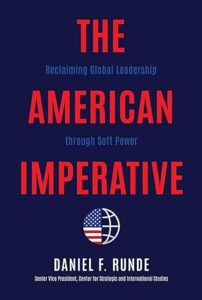World Geostrategic Insights interview with Daniel Runde on the implications of China’s rise for Western values, the significance of soft power in the competition between the great powers, the tools and resources the United States has to compete with Russia and China using non-military power alternatives, and China’s approach to soft power.

Daniel F. Runde is a Senior Vice President at the Center for Strategic and International Studies and holds the William A. Schreyer Chair in Global Analysis, where he focuses on the role of using soft power to shape the future. Mr. Runde has advised governments and international institutions. Among his many contributions, he was an architect of Prosper Africa, a U.S. government initiative to deepen the United States’ commercial and development engagement in Africa, and a leading voice on the role and future of the World Bank Group and U.S. leadership in a multilateral world order. He is the author of “The American Imperative: Reclaiming Global Leadership through Soft Power“.
Q1 – In your recent book “The American Imperative: Reclaiming Global Leadership through Soft Power,” you state that the rise of China under Communist Party rule poses the greatest threat to the United States and the West, so the U.S. has the duty to prevent China from ruling the world. Why is China so dangerous? Why should China’s pursuit of a global economic predominance have negative implications for the values and way of life of the West? What do you imagine a world under Chinese leadership would look like?
A1 – The West has not used its collective imagination to envision a world led by China in a coalition of other autocratic countries such as Putin’s Russia, the Ayatollah’s Iran, or Venezuela under Maduro. As we speak, China is clearly making a conscious decision to reset the global system and bend the rules of the system towards its liking.
The current liberal international order depends upon globally accepted rules and having nations willing to pay the fees for financial and security stability. The liberal international order also accepts the serious responsibility to take on many of the global public goods including development, environmental considerations, and public health.
The current system has allowed for a series of important projects to be pursued, including: human rights projects envisioned and enshrined within the United Nations Declaration of Human Rights, and a democracy project that, since the end of World War II, has seen the expansion of liberty around the world, building a freer and more prosperous world than 70 years ago, albeit with many setbacks. This experiment in democracy has left many developing countries more educated and healthier than 60 years ago. These achievements can partially be attributed to United States leadership and its ability to convince developing country governments to make sound decisions for their people.
I think your readers should ask themselves what things we take for granted that are really important, such as the prevention of a great-power war; who is best positioned to provide leadership on environmental issues; which system is best positioned to protect human rights and expand democratic norms; and, other conceptions such as the international rule of law, financial law, and the ability to prevent a third world war.
The ability to move freely, voice opinions, have the freedom of association to create non-governmental organizations, and religious freedom— all these things require international cooperation at some level. Does anyone believe a world led by the Chinese Communist Party (CCP) would be better stewards of these values? The answer is no. That is why I wrote my book, The American Imperative, and gave more than 100 book talks to spur a conversation in the West on how we can compete with Russia and China. In my talks, I have not yet met any American citizen who can answer that question affirmatively. I have also made it a point in my more than 80 talks to ask if anyone plans on moving to mainland China or Russia in the next months, or if they know anyone moving there. The answer is once again no.
China led by the CCP and Russia led by Putin’s murderous regime are societies unattractive to the best and brightest minds, which means that in the long run, they cannot compete with winning the best minds. The highly educated and capable individuals in Russia are fleeing, and in China, they are considering fleeing. A world led by China will be a world where human freedoms are at risk. Human rights would become vulnerable; democracy would be on the defensive; environmental care and stewardship would be threatened; and freedom of speech and association would be tampered with by technocratic authoritarians.
China will throw its weight around to intimidate its neighbors and seek neo-colonial relations with countries in the global south. If the U.S. does not continue to lead a liberal global coalition, if the US turns its back on global responsibilities and thinks it will be protected by two oceans, the US will find it will be forced to engage with the world sooner rather than later. Across a variety of dimensions of power and components of the liberal international system, China is challenging many established rules and values, and they are seeking to reorganize the system in ways that we should not want for ourselves or for our children to live in.
Q2 – In your book, you also argue that the competition between the United States and China, and even Russia, is more likely to take place in the arena of soft power, rather than hard military confrontation, through financial, economic and political alliances in various regions of the world. Without leadership in soft power, you assert, the United States risks being on the losing side in the competition with rival powers. In particular, the U.S. must work to counter Beijing’s growing influence in the world, especially in developing countries, by integrating development assistance within U.S. foreign policy and ensuring an alliance of stable, secure, like-minded and self-reliant partner countries. What is your definition of soft power? What does it include? What new approach to diplomacy and foreign assistance should Washington implement? With what tools and economic resources?
A2 – Soft power entails various forms of nonmilitary power at its disposal. Joseph Nye defined soft power in 1990 as “when one country gets other countries to want what it wants might be called co-optive or soft power in contrast with the hard or command power of ordering others to do what it wants.”
I have a wider definition, which proves a helpful starting point. This era of great power competition will not be fought with tanks and missiles, but rather by using training, human personnel, infrastructure, technical capabilities, economic ties, political alliances, values such as democracy versus authoritarianism, and who sets new rules and standards in various multilateral organizations. Multilaterals are considerably powerful, but they are not well understood in the West, despite the US creating most of them after World War II.
This current great power competition is about ideas such as trade, what languages are spoken internationally, and whether or not the U.S. dollar or another country’s currency will become the new internationally preferred currency. It is also about vaccines and many forms of global development assistance. But it is not just about assistance, it is also about new tools that we can utilize. It is really about recognizing that we are in this new age of competition, so we have to get a better understanding of the stakes, and we need to rethink how to better allocate people, time, and money. This also means working with our partners and allies, a top-to-bottom review of how we spend our resources, and it may mean reallocating resources from one priority to another.
Would this mean a net increase in our foreign aid budget? Perhaps, yes, in certain targeted areas that should be considered vitally important. It may also mean rethinking policy toward global trade, and rethinking free trade because if we fail to do so, then China will inevitably become the dominant trade partner for developing countries. So through my book, The American Imperative, and lectures about the book, I want to stimulate a conversation in the United States and the West about how we can compete with Russia and China using non-military power alternatives.
My hope is that with the 2024 presidential cycle, perhaps this current and the next administration will turn toward the non-defense tools of our power and make necessary adjustments to compete properly in this new era. Fear of the CCP leading the world is what will focus minds and force the necessary changes.
Q3 – The increasing expansion of the People’s Republic of China’s (PRC) engagement and presence in Latin America and the Caribbean has raised concerns in the United States. At the Summit of the Americas held in Los Angeles in June last year, U.S. President Biden spoke of a U.S.-Latin American partnership aimed at “stimulating growth and economic recovery” on the continent, fighting corruption and climate change, but also countering Beijing’s growing influence. However, in a speech at the National Palace on Jan. 9, Andrés Manuel López Obrador, president of Mexico, said the United States has “forgotten,” “abandoned,” and shown “contempt” for Latin America and the Caribbean. How do you judge this statement? Has the United States in the last years failed in soft power in Latin America? How do you judge the policy toward Latin American countries of the current U.S. administration? Is it going in the direction of a revival of development assistance and soft power as you have advocated?
A3 – The United States has a tentative relationship with the western hemisphere. We often take it for granted. The region is free of major wars. It has numerous challenges, but over the last 50 years, it has become freer, more prosperous, and seen significant progress.
The U.S. has been a partner in many of those positive changes since 9/11. Yet it has been increasingly difficult to get administrations to pay attention and engage in Latin America.
At the same time, many Latin American countries have become middle-income countries. They are not poor anymore, despite pockets of poverty. We need to engage with them as middle-income countries. They do not need as much help with basic needs. What they require is assistance with technology sharing, infrastructure build-out, energy, and deeper trade relationships. Sometimes it is about human capital development.
 The U.S. offer to Latin America could and should be improved upon. Frequently over the last century, the U.S. had focused and made constructive progress in Latin America. Yet this focus was often out of fear of foreign rivals. Some examples of this are Franklin Delano Roosevelt’s good neighbor policy; John Fitzgerald Kennedy’s response to Castro’s takeover of Cuba and the looming challenge of communism in the Western Hemisphere through his “Alliance for Progress”; and the Reagan administration’s Caribbean Basin Initiative, which also included American engagement in Latin America to rollback communism and support democracy in Central America.
The U.S. offer to Latin America could and should be improved upon. Frequently over the last century, the U.S. had focused and made constructive progress in Latin America. Yet this focus was often out of fear of foreign rivals. Some examples of this are Franklin Delano Roosevelt’s good neighbor policy; John Fitzgerald Kennedy’s response to Castro’s takeover of Cuba and the looming challenge of communism in the Western Hemisphere through his “Alliance for Progress”; and the Reagan administration’s Caribbean Basin Initiative, which also included American engagement in Latin America to rollback communism and support democracy in Central America.
Since then, there have been attempts in the Trump and Biden administrations, including through the Summit of the Americas. President Biden made about 16 trips to Latin America as vice president, and President Biden invested a lot of time on a 2023 Central America partnership, so he has been particularly committed, even not especially accomplished. Since the Bush administration, major initiatives in Latin America have been few and far between.
A new administration should find ways to prioritize the hemisphere because today there are 30 countries in the western hemisphere and China is the number one trading partner with 9 of them, and the second largest trading partner with the rest. That number is up from 0 as of twenty-five years ago. Use this as a proxy. We can ignore the region and leave a void in the hemisphere, but China will fill it. So, I want to stimulate a debate in the United States and the West on how we can compete with Russia and China using soft-power.
Our attention cannot just be on gangs, drugs, and migration, although those are important. It must be more than that. President Kennedy was right when he set up the Alliance for Progress which was a positive, forward-looking agenda that spoke to the hopes and aspirations of partners and potential partners in the region.
The U.S. needs to put forth a substantially larger commitment to the western hemisphere, one that speaks to the hopes and aspirations of friends and potential friends, one that is better than the bilateral commitments China has negotiated. China is answering Latin American countries on everything except gangs, drugs, and migration, while the U.S. primarily focuses on those three issues. The Western Hemisphere wants the U.S. to focus on things in a different order of priority.
Q4 – How would you define China’s soft power? What does it really offer to the developing world? What more could the United States offer in economic and financial terms? The laudable goal of preserving the liberal, international world order, and human rights, a major concern of Western and other countries traditionally linked to the West, may not be of interest to or a priority for countries in other areas of the world. So why would a country in the Middle East, Africa or Latin America, choose a privileged, and perhaps exclusive, relationship with the United States over China?
China captured the global south’s imagination with the Belt and Road Initiative (BRI). The BRI is a positive forward-looking agenda that speaks to the aspirations of friends and potential friends. The United States and the Western multilateral development banks were more reluctant to advance nonrenewable energy, such as oil and gas, and unwilling to pursue large infrastructure projects. China, on the other hand, was willing to do so. Thirty years ago, we could tell developing countries, ‘Take it or leave it,’ and that was our offer. But when China is a near-peer competitor offering a positive alternative, we are foolish if we just say, ‘Do not take Chinese money, do not build ports, etc.’ Developing countries want ports and energy, and we say we cannot help you build ports or get oil out of the ground, so naturally they go to someone else who will because developing countries have other options today.
If given a choice between the U.S. and China, in most cases they would prefer to work with the U.S. But we have to show up. Our business community has concerns about business risks in places like Africa, but China sees Africa as an enormous business opportunity. Maybe we could learn from China in this regard. We should not give up our insistence on our democratic values and human rights, but we need to know the specific audiences we are targeting and know what to emphasize with potential partners.
We can cover all issues that are important to us, but we should find ways to do so in this new age of great power competition, which has echoes of the Cold War. We should make it known that we will have to work with imperfect authoritarian regimes, and our space to push democracy and human rights will be smaller. When we have to pick, we should put pressure on areas such as corruption, and we have to make sure we are not favoring one party over another.
The U.S. is perceived as supporting progressive over conservative groups. We need to be aware of that because corruption is an equal opportunity among liberals and conservatives. We should be even-handed on these issues.
So part of U.S. success is just showing up. Another part is over time China will be viewed as neocolonial given the way China treats other countries.
But in the meantime, we cannot fight something with nothing. We need to compete with Russia and China using non-military power alternatives. We cannot say, “Do not take Chinese ventilators,” if we cannot provide them ourselves, or ‘Do not take Chinese vaccines.” if we will not provide them ourselves. We do not have to match China dollar for dollar, but we need to enable alternatives and speak to the hopes and aspirations of partners and friends who do have an alternative option in China. We need to adapt our approach accordingly.
Daniel F. Runde – Senior Vice President at the Center for Strategic and International Studies, author of “The American Imperative: Reclaiming Global Leadership through Soft Power“







